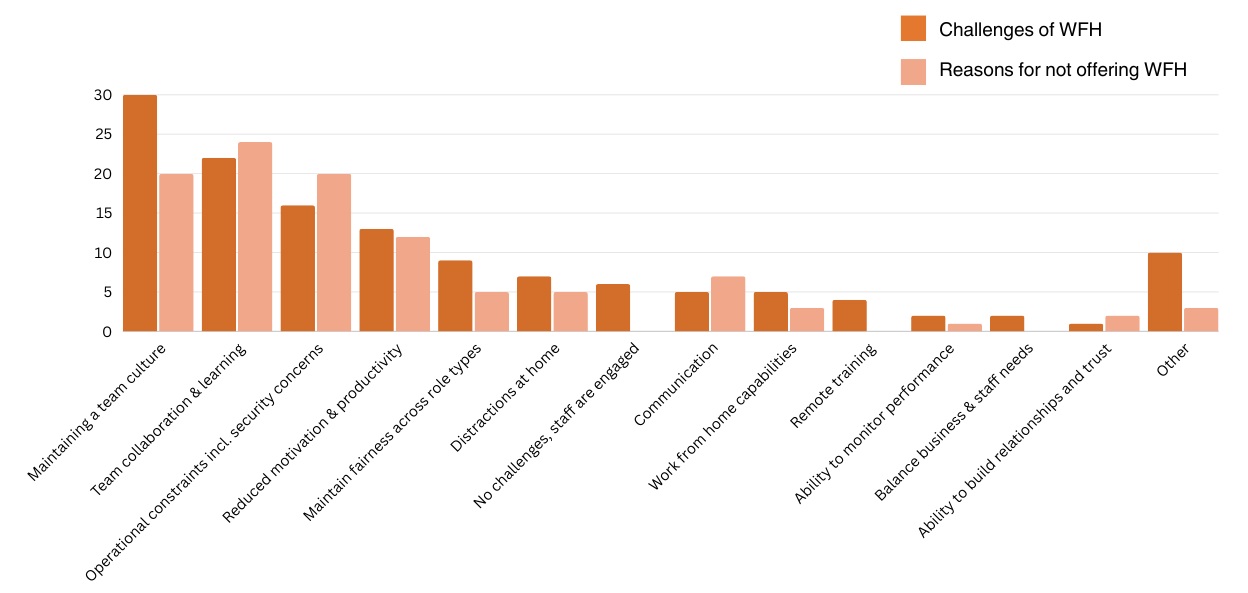Eclipse Recruitment conducted a work-from-home client survey. The objective was to delve into the views and policies of a wide range of business owners and managers to better understand the current landscape when it comes to remote working.
This summary draws insights from our survey and sheds light on current approaches, challenges and benefits of hybrid or Work From Home (WFH) arrangements as we see this continue to evolve.
1. What is your Work From Home (WFH) policy?
It was interesting to find that more than 60% of employers surveyed offer some form of a WFH option to their teams. Of those that do offer WFH, about 45% don’t actually have a set work from home day or days, but rather have the option there for staff if required.

2. What are the benefits of WFH for the staff and the business?
Most of those surveyed saw the work/home life balance as being a key consideration in offering WFH and that this contributed to increased staff wellbeing and satisfaction, and also had a positive effect on attraction and retention of great people.

3. What equipment do you provide to WFH?
The most commonly provided are a laptop, mobile and an additional monitor. Very few of those surveyed offer an internet or other type of WFH allowance. Only a small number of those surveyed provide a ‘whole office’ setup for WFH, with many not wanting to have to supply two sets of equipment to each employee.

4. What does flexibility mean to your business?
Just over 40% of those surveyed offer either flexible start and finish times or fully flexible work hours. Many saw that the WFH offering is a form of flexibility. Others are more than happy to offer flexibility for medical or family appointments, and are happy to accommodate people’s requests. Most of those surveyed were happy to be flexible, but not to accommodate shorter hours – i.e., people are expected to ‘make the time up’ if they are juggling outside-of-work commitments.

5. What are the pros and cons of WFH?
Most of those surveyed, including those choosing to offer WFH, saw maintaining team culture as the biggest challenge they face. Many feel that being office based helps foster a stronger culture, more opportunity for team collaboration and for ‘spontaneous’ learning opportunities.

Recommendations
Evaluate WFH feasibility
If you don’t already have a WFH arrangement, a great place to start is to assess your company’s readiness to embrace this way of working. You can do this by first checking the basics – equipment and IT systems: can your people get the job done while fully online? Next consider team collaboration and connection – do you have the processes in place to ensure that people are well supported and connected with each other while working remotely? Do your managers need training or guidance on how to effectively manage a remote team?
Focus on culture
Put strategies in place to ensure that you maintain or enhance your company culture. Regular team meetings, online social activities and creating connections between teammates all help to foster a positive culture. Remember culture is about how you show up, how you communicate and how your teams live and breathe your values so keep this in mind when you consider how you can make remote working positive for your business.
Address challenges proactively
Ensure that any challenges you face are discussed openly with your team. Ask for their input on how to solve any issues or challenges that you might face. If you don’t have WFH arrangements in place, you might consider a trial period where you can identify the pros and cons for your business and team before committing to a more permanent arrangement.
Download the Work From Home Client Survey infographic.
